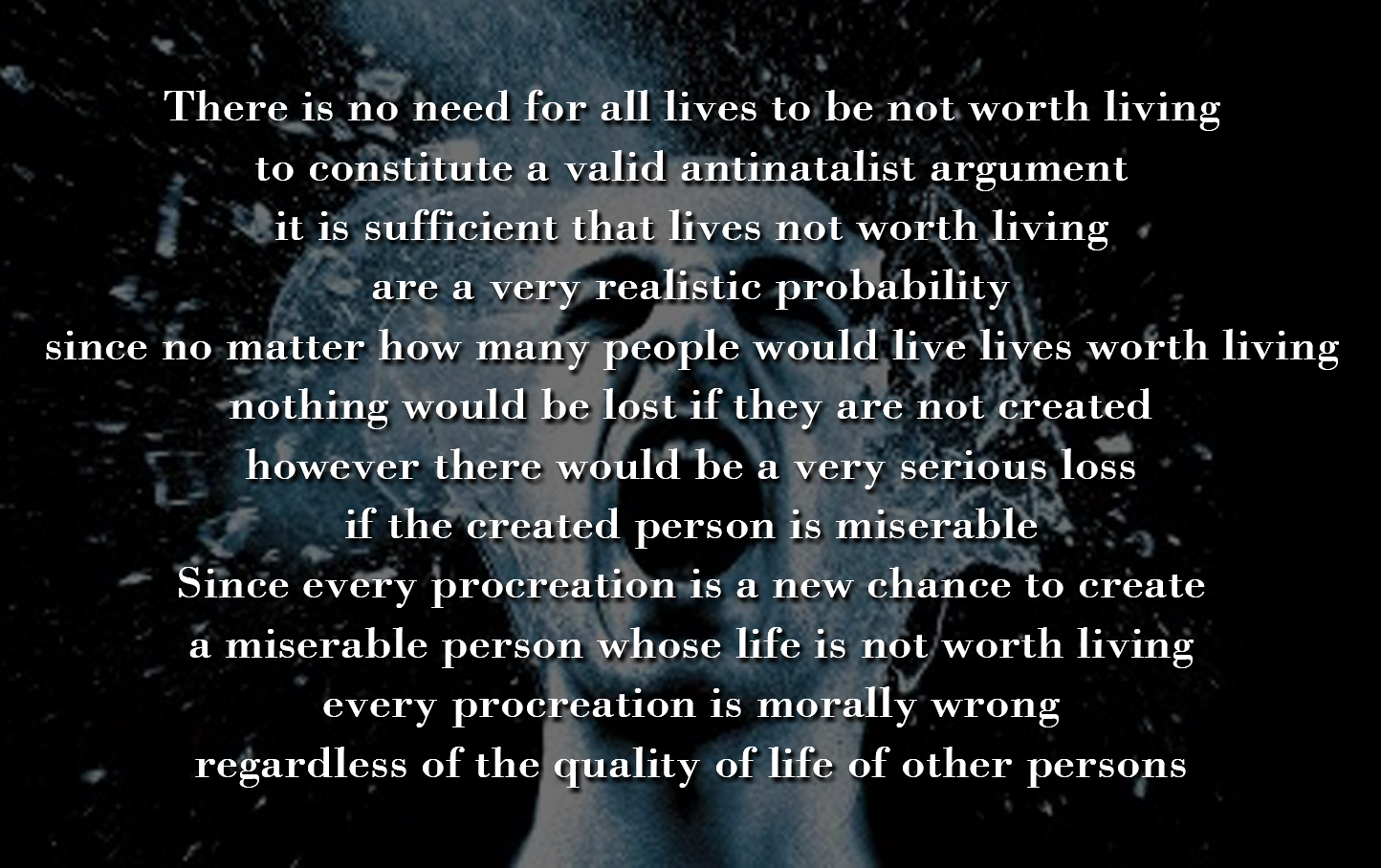Pro-natalists tend to confuse the claim that ‘procreation is always wrong’ with the claim that ‘life is always not worth living’. These claims utterly differ, and the differences between the two are quite important. I’m not referring here to Benatar’s differentiation between life worth starting and life worth continuing, a distinction many of his critics have chosen to ignore, usually by referring to both cases as life worth living. Although this is an important point by itself, this is not the one I want to make here. I am referring to the false inferring that since there are people who feel that their lives are worth living, maybe even most, then the claim that procreation is always wrong is false. That is a conceptual confusion in the best case and a manipulation in the worst.
It is a manipulation when it is ascribed to Benatar, who actually argues that all life is not worth starting, not that all life is not worth living, and it is a conceptual confusion since the argument that procreation is always wrong isn’t necessarily derived from the claim that every life is not worth living. There are many antinatalist arguments and most aren’t founded on the premise that all life is not worth living. One of which is the argument that it is morally wrong to impose a decision, let alone the most important one in someone’s life, without consent, and since it is always impossible to get consent in the case of procreation, procreation is always wrong, regardless of the quality of life of that person. According to the consent argument, procreation is wrong even in cases of life worth living because they were imposed on the person without consent.
Another argument which unties the stilted connection between antinatalism and life worth living, is the risk argument.
There is no need for all lives to be not worth living to constitute a valid antinatalist argument, it is sufficient that lives not worth living are a very realistic probability, since no matter how many people would live lives worth living, nothing would be lost if they are not created, however there would be a very serious loss if the created person is miserable. Since every procreation is a new chance to create a miserable person whose life is not worth living, every procreation is morally wrong, regardless of the quality of life of other persons.
And the most important antinatalist argument in my view is that every procreation is wrong even if we could theoretically be assured that each one would result in a life worth living, since we are always practically assured that each procreation would result in a life of misery for other sentient creatures. There are absolutely no lives who are not at the expense of others, and most lives are absolutely cruel, causing misery, abuse, confinement, loneliness, sickness, chronic pain, fear and despair. There are no good lives that can ever justify all this misery, certainly not when it can be easily avoided by simply choosing not to procreate.
The constrained false linkage between the claim that ‘procreation is always wrong’ and the claim that ‘life is always not worth living’ is very convenient for pro-natalists since they know the common perception among the general public is that procreation is not only utterly acceptable but is also considered a blessing. This is how even philosophers can get away with such an invalid move. Procreation is always wrong and for various reasons, some of which were detailed earlier in this text. But pro-natalists prefer to present antinatalism as if it is necessarily founded on the premise that all life is not worth living, since it is the easiest way out.
The ease in which pro-natalist choose the easy way out is extremely worrying. We are not in a debate. We don’t get points for good arguments, and pro-natalists are not disqualified for utterly false ones, or for completely distorting ours.
Antinatalists surly easily defeat pro-natalists in the theoretical debate, but pro-natalists are winning in real life. And their win is billions of sentient creatures’ loss. Arguments will not convince pro-natalists, so to stop procreation what we need is not good theoretical claims but efficient practical methods.
References
Benatar David and Wasserman David, Debating Procreation: Is It Wrong to Reproduce? (Oxford: Oxford University Press, 2015)
David Benatar, Better Never to Have Been (Oxford: Oxford University Press, 2006)
Shiffrin, Seana. Wrongful Life, Procreative Responsibility, and the Significance of Harm Legal Theory 5, no. 2 (1999): 117–48

Leave a Reply